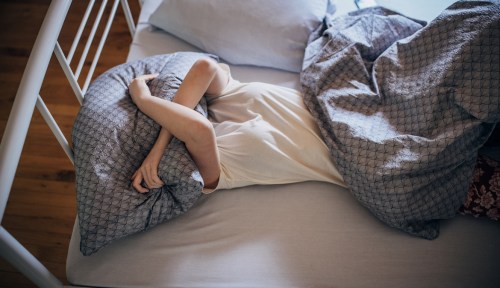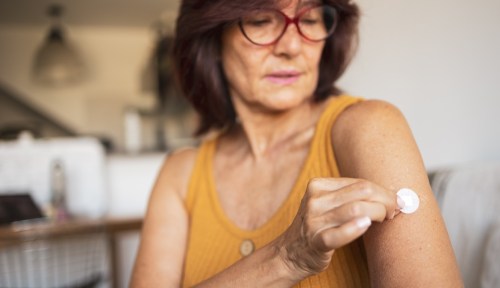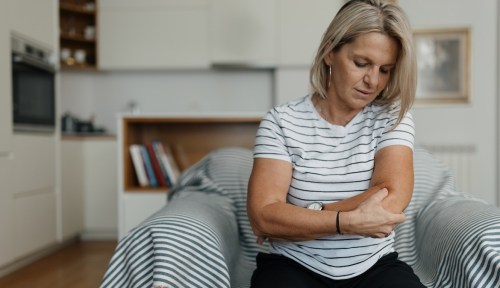Here’s Why You Might Get Night Sweats—Even if You’re Not in Menopause
Learn about the causes of night sweats in non-menopausal women, plus how to tell if they're normal or a sign to call your doc.

Waking up with damp sheets is more common than many people think—and it’s not just happening to menopausal women, says Robin Berzin, MD, founder and CEO of the functional medicine practice Parsley Health. But there are steps you can take to stay cool once you understand the common causes of night sweats, she says.
Experts in This Article
doctor, entrepreneur, and founder of Parsley Health
Most people associate excessive sweating at night with menopause. And it’s true that it’s one of the classic signs of menopause and perimenopause, along with mood swings, weight gain, vaginal dryness, decreases in libido, and urinary urgency. These symptoms can start as early as the late thirties or early forties, although in the United States, the average age for menopause is 51.
Anywhere from 10 to 40 percent of adults report night sweats in a given year.
Yet some women in their twenties and thirties who are not in menopause report night sweats coming in waves, leading to drenched pajamas and sheets, and they mistakenly fear that they are going into early menopause. Usually, however, this isn’t the case.
What are the most common causes of night sweats?
Night sweats—like poop sweats—are actually relatively common. Anywhere from 10 to 40 percent of adults report them in a given year1. There are a few reasons you might be having night sweats, even if you’re far from menopause and your cycles are perfectly normal. And it could be messing with your sleep health.
Normal variations in your menstrual cycle
We know that as estrogen decreases, the body’s “thermoneutral zone,” which is dictated by the brain, gets narrower. This means there’s a smaller window of ambient environmental temperature that your body will tolerate before it tries to compensate by changing its metabolic rate or using evaporative heat loss—aka sweating.
This is part of the reason for night sweats in menopause. But during a woman’s regular menstrual cycle, estrogen levels are quite low for the first week (when she has her period) and again on days 26 to 28, right before she gets her period (assuming a 28-day cycle). So if you’re getting night sweats periodically, notice if they’re falling in this part of your cycle. It could be caused by low estrogen, since your menstrual cycle and night sweats are connected.
Low blood sugar
When blood sugar drops—causing either hypoglycemia or something known as “relative hypoglycemia,” meaning the level of sugar in the blood is technically normal, but the sudden drop is enough to trigger hormones like adrenaline and cortisol—night sweats can result. This is more common in people with diabetes, who have a hard time regulating blood sugar in general. It also can happen in people who are eating an imbalanced diet, with too little protein and fat to balance blood sugar over time. At Parsley Health, we analyze dietary patterns and encourage the consumption of protein, fat, and fiber in the evening to help regulate blood sugar throughout the night. Tip: Have a tablespoon of almond butter or an egg before bed to regulate blood sugar while you sleep.
Anxiety
Almost everyone has anxiety at times, whether it comes in the form of racing thoughts and generalized anxiety, or if it flares up here and there situationally. Underlying anxiety increases sympathetic tone, or the activation of the fight-or-flight side of your nervous system. This, in turn, increases the hormones and neurotransmitters cortisol, adrenaline, and norepinephrine in the body. That leads to the constriction of your peripheral blood vessels (called vasoconstriction). And ultimately: The body’s temperature increases, and the body triggers sweating to cool your off.
Alcohol
Pay attention to your alcohol consumption and night sweats patterns to see if imbibing could be the culprit. Alcohol disrupts the body’s ability to thermoregulate2 in both directions, causing both sweating and shivering. Even a glass or two of wine can be enough to interrupt sleep and disrupt body temperature in some people. So if you’ve ever thought why do I get so hot when I sleep?, your nightcap could be the reason why.
Medical conditions and night sweats
While normal biology and lifestyle factors are the most common culprits, night sweats could also be a symptom of medications you’re taking or of more serious conditions.
Infections and cancer
Underlying infections like tuberculosis, brucellosis, and some parasites can cause periodic night sweats—as can cancer. In these conditions, periodically inflammatory chemical messengers called cytokines (like IL-6 and TNF) are released in the blood. This triggers changes in the thermoneutral zone, and the body then compensates to lower your core temperature by sweating.
Medications
Certain medications, including antidepressants like SSRIs, diabetes medications like metformin, and opioids like oxycodone, can also disrupt the body’s ability to regulate temperature. If you are taking any of these medications, discuss with your doctor whether they could be the cause of your symptoms.
Editor’s note: If you suspect a medical issue may be behind your nights sweats, or if you have trouble making lifestyle changes to address the common culprits, speak with your doctor to talk about your symptoms, address possible solutions, and test for/rule out other more serious conditions.
Just need a little extra help staying cool while you slumber? Check out Well+Good’s recs for cooling pajamas, cooling pillows, and cooling sheet sets.
—reviewed by Angela Holliday-Bell, MD
Mold, James W et al. “Night sweats: a systematic review of the literature.” Journal of the American Board of Family Medicine : JABFM vol. 25,6 (2012): 878-93. doi:10.3122/jabfm.2012.06.120033
↩︎Kalant, H, and A D Lê. “Effects of ethanol on thermoregulation.” Pharmacology & therapeutics vol. 23,3 (1983): 313-64. doi:10.1016/0163-7258(83)90018-9
↩︎
Sign Up for Our Daily Newsletter
Get all the latest in wellness, trends, food, fitness, beauty, and more delivered right to your inbox.
Got it, you've been added to our email list.










